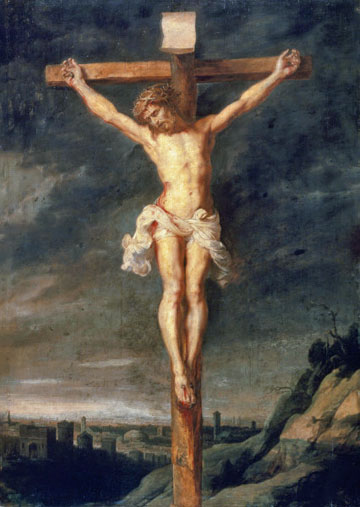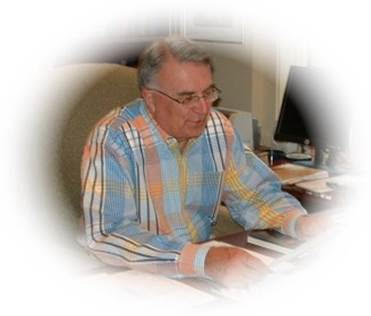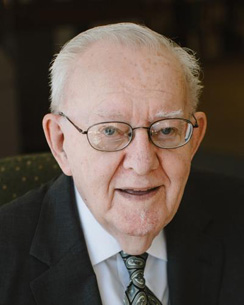March 2021
|
We remember every year in the Church during Holy Week the
last week in the life of Jesus. This year it is the last
week of March. During that week we dwell on how and why
Jesus was crucified. Acts 2:23 is our best explanation –
|
|
“A Masterpiece to Study for Lent”
Ron Marshall has
been pastor of First Lutheran Church of West Seattle since 1979.
I have just completed reading a book of his sermons, Kierkegaard
in the Pulpit (2016). They are some of the most remarkable
sermons I have ever read, and that is saying something since I
am now entering into my eightieth year, after fifty-one years of
preaching myself. I discovered
Pastor Marshall in my studies of Søren Kierkegaard and ordered
his two published books on the subject. I was amazed at his
erudition and his faithfulness to the Gospel. He has read more
widely than anyone I know, both critics of Christianity and the
works of Martin Luther and Kierkegaard.
His messages are uncompromising to the world, the flesh and the
devil and theological innovation. He is committed to “old”
Christianity which “knows about and believes in the
desperateness of sin, the centrality and uniqueness of the blood
sacrifice of Jesus to overcome God’s wrath for our salvation,
the struggles of faith, the pressing need for and difficulty of
denying ourselves on a daily basis, and the fear of everlasting
judgment.” He “cannot abide by the revision to Christianity
which says that there is no Judgment Day. And the same goes for
saying that the Bible is not the definitive Word of God for all
time.” The reason for his sermons is “to consistently drum into
our hard heads the severe mercy of God in Jesus Christ.”
He is not an old fogey. He is a student of Bob Dylan’s songs,
writings, paintings and movies. He has been teaching a four-week
class for years to hundreds on “Reading the Koran”. All proceeds
of the sale of his book go to benefit the West Seattle Food Bank
and the West Seattle Helpline.
His sermons cover all the major themes in Christianity: the
parables of Jesus, the Christmas story, the atonement, heaven
and hell. His footnotes are a treasury in themselves as they
extensively quote atheists, pundits, commentators, critics of
Christian orthodoxy, preachers and postmodern philosophers. He
also includes a review of his first book on Kierkegaard (Kierkegaard
for the Church, 2013) by a member of his congregation, a
retired Union ironworker who claimed to have read only three
books in his life – the Bible and the biographies of Crazy Horse
and Hank Williams and was raised in a horse barn! He looked up
every word he didn’t understand and penciled in the meanings,
off to the side of the page, knowing that this would help him
re-read the book later with greater ease and understanding. He
found something on every page he had to underline and stress for
future study. He made himself read all the footnotes on every
page. It took him three and half months to complete it. What
dedication!
I cannot commend this book enough. I salute the congregation of
First Lutheran Church of West Seattle for drawing this out of
their pastor and supporting him in his ministry all these years.
Order a copy for yourself. You will not be disappointed.
Ted Schroder
Fernandina
Beach, Florida
(reprinted from
his blog,
tedschroder.com, February
16, 2021.) |

President’s Report…by
Cary Natiello
Hello First
Lutheran Church members,
At the Annual
Congregational Meeting held on January 31, 2021 our church
budget was approved.
The budget contained some important aspects to note.
1. The congregation approved the 2021 operating budget of
~$275,000, which was basically the same as our 2020 budget
($276,000).
2. Based on giving in the second half of 2020, and as has
continued through the first seven weeks of 2021, our projected
income for 2021 is likely to fall significantly short of the
giving needed to meet the approved 2021 budget of ~$275,000.
3. The congregation approved the 2021 budget anticipating that
we will need to use the cash we had at the end of 2020 to meet
our 2021 budget.
4. At the end of 2020, we had about $57,000 in cash available
for covering the anticipated 2021 budget shortfall.
We projected we would need to use one-third of the
$57,000 (or $19,000) to cover the anticipated budget shortfall.
If the current trend continues throughout 2021, we’re
likely to use closer to half or two thirds of the $57,000 (or
$28,500 to $38,000).
We were blessed with fabulous (and unusual) giving in 2020,
which allowed us to give additional monies to our extended
ministries and also to build up our cash reserves.
Our cash reserves are what allowed us to approve the 2021
budget. Without
those reserves, our 2021 budget would have had to be
significantly less with significant reductions in our expenses.
Praise God and our congregation for 2020 ending so strong
that it can continue to benefit us well into 2021.
But, just like how you run your own home budget, it is not a
preferred or good practice to use ones reserves to cover typical
operating expenses.
In other words, you don’t want to spend more money than you take
in at any given time.
The cash that we had from 2020 could be gone before we
know it and we will obviously be in a very different situation.
I will keep you informed monthly as to where our finances
stand throughout the year.
God bless you for your continued support of God’s place
of worship. By
sustaining the church through this astonishingly strange time,
we can look forward to coming back to what we have come to love
and expect from attending our indoor worship services.
At the March council meeting we will discuss identifying
and adopting measurable metrics to better define our
CRITERIA
for RESUMING INDOOR WORSHIP SERVICES at FLCWS (Criteria
#3), which states, "Newly diagnosed COVID-19 cases during the
prior two weeks in King County are minimal and declining.” Our
goal is to have an easily identified threshold to use to
determine when in-person worship services will resume.
Finally, I want to recognize Dale Korsmo and Ken Hovde.
It seems like there is not a week that goes by that Dale
and Ken aren’t working on a maintenance or repair project, or
installation of new equipment for First
Lutheran Church.
Without them, we would be spending a ton of money on
all the projects that
they do for the church.
They are truly a gift to us.
Thank you Dale and Ken for all your work, expertise, and
devotion. You both
are truly one of a kind and we are thankful to have you.
|
|
STEWARDSHIP
Grateful Giving
Below are excerpts from previous stewardship articles and
sermons that I put together to share with you for this month’s
stewardship article:
·
Stewardship means using our talents to glorify God.
·
We are the trustees of the time, talents, gifts, treasures and
the values of the community we all live in.
·
A beginning point in looking for ways to best be good stewards
is to listen in prayer and be open to God’s guidance.
·
Search the Bible for answers to stewardship.
Search your hearts for opportunities to grow in your
understanding and application of how we can each better commit
our talents and gifts to the life of the church.
·
Politics aside, as Christians, we are called to be stewards of
the earth.
·
Thanks to everyone for your continued financial support during
these trying times.
·
“As you, Lord, have lived for others, so may we for others
live.” LBW 364.
·
Even though our life is a little rocky right now, we are still
required to be responsible stewards of our commitments which
would include time, talents and money.
·
Our role is to rejoice and be grateful, and to stay faithful and
engaged even when that is daunting to do.
·
I am reminded of the parable of the talents where three workers
were given various amounts of talents to care for – two of them
used it to increase their value for the owner; the third one
buried it where it just got dirty and did not grow.
We are to use what he allotted to us in the best way
possible and for his glory.
·
When you enter
into battle… against sin, death, the devil, the Law, and God’s
wrath, beware that you do not boast of your merit or work, but
rather with sure faith lay hold of Christ, who has overcome sin,
death, devil, and hell for your benefit. For only Christ’s merit
and suffering is so powerful, so precious, so infinitely
valuable in God’s eyes that it covers all your sin, appeases
God’s wrath, and overcomes death, the devil, and hell.
Therefore, it alone should possess the glory. Your works cannot
accomplish all this…. But when you have… righteousness before
God through faith in Christ, then see to it that you demonstrate
your faith and do good works to extol and praise God and to
serve your neighbor.
[Martin Luther, Sermons on John 19 (1529)
Luther’s Works
69:270.] · “Faith apart from works is dead” (James 2:26).
|
|
Carl F. Schalk
(1929–2021)
Carl Schalk,
at 91 years of age, died in his home outside of Chicago on
January 24, 2021. He was a world famous church musician, a
composer of many hymn tunes, a Lutheran church historian, and an
author of many seminal books. Our congregation was blessed to
have him compose many hymn tunes for us. They are:
Lord, We Will Remember
Thee (2002),
Thankless for Favours from on High (2004),
Commit Thy Way, Confiding
(2013), We Had to Have
Him Put Away (2014),
To Avert from Us God’s Wrath (2016),
I See The Stand, O Lamb
of God (2018), and
Blessed Bible, Book of Gold (2019). We thank God for his
faithful service. And we pray that his memory may be blessed
among us.
To listen to recordings of most of these hymns, go to flcws.org. |

ANNOUNCEMENTS:
WEB PAGE ADDRESS:
www.flcws.org
Log on to see what is new!
At the
moment our webpage is even more important with our
Online Worship page
each Sunday.
FOOD BANK DONATION
suggestions for March are canned meats, chilies and stews.
Pastor Marshall will take your donations to the West
Seattle Food Bank if you drop them off at the church.
ZOOM online Koran Class:
Join Pastor Marshall’s
next class on Monday, March 1st.
This in depth study of the Koran continues through Monday
the 22nd. Call the
office if you would like to be sent a link.
Home Communion
is available to the congregation on request.
“With the Mind”
Zoom online book discussion
(J. M. Coetzee,
The Schooldays of Jesus:
A Novel, 2016),
is planned for Sunday, March 14 at 3:30 pm.
Please contact Pastor Marshall by email or phone to be
sent a link to join the discussion group.
MARK YOUR CALENDARS
–
West
Seattle
Food
Bank Instruments of Change yearly
benefit will be online again
this year.
The
virtual event will be on Saturday, May 15, 2021 beginning at
5:30 pm on all of their online platforms.
The Lenten season:
A time for spiritual preparation through repentance and growth
in faith as we remember the suffering and passion of Christ.
Join us this Lent for a ZOOM Bible study on James, 7 pm
on Wednesdays, starting February 24th and going through March
24th. Contact
Pastor Marshall to get a ZOOM invitation to this class.
|
|
The Apostle Saint Paul
“I
press on toward the goal for the prize
of
the upward call of God in Christ Jesus.”
(3:14)
by Pastor Marshall
Martin Luther
believed that this verse calls us to “deal with this temporal
life such that we think of leaving it behind us.” So rather than
fixing our minds on earth (Colossians 3:2), we should “strive
for the blessed hope [of] the goal and jewel put before us,
which [is] the heavenly calling of God in Christ Jesus,… so that
we always wait for it” (Luther’s
Works 57:28). Luther called this the “constant gaze” of
faith (LW 26:356).
This belief is based on the conviction that “losing eternity in
exchange for an hour or two is no good trade” (LW
68:61). Why? Because our life here is “a miserable and
calamitous life [and so we long to pass from] this prison to the
radiance of a better life” (LW
67:308). Deflating the temporal, Christians then are to “only
strive to be in Christ forever” (LW
79:275). Without this focus, Christians are “cold today, much
colder tomorrow, and are thus incorrigible, sluggish people (LW
56:325).
We should therefore stay focused on Christ forever, and “not
calculate how many laps of virtue we’ve finished but how many
are left for us…. For in this way we become ardent, when we
engage all our enthusiasm in what is left to do, when we consign
our successes to oblivion…. Look at the extent of the distance
we have to run; look at the extent of the height. We have to fly
there with the wings of the Spirit – otherwise, it’s not
possible to make our way to this height” (John Chrysostom,
Homilies on Philippians,
trans. P. Allen, 2013, p. 253). This is where the Christian is
to be – “in between as the point where the decision is made, as
the pivot of the great inversion, not making up his own mind but
having his mind made up, not turning himself the other way
around but being turned the other way around, not himself moving
but… driven by the Spirit of God” (Karl Barth,
Epistle to the
Philippians, 40th Anniversary Edition, trans. J. W. Leitch,
2002, p. 109). In these words “the lungs burn, the temples
pound, the muscles ache, the heart pumps, [and] the perspiration
rolls [because faith involves] running, wrestling, striving, and
fighting” (Fred Craddock,
Philippians, 1985, pp. 61–62). “A close analysis of this passage, while intellectually clarifying, can lose sight of its deep fervor” (Bonnie B. Thurston, Philippians, 2009, pp. 129–30). Luther would agree. Therefore he warns that whoever is “unwilling to serve with a fervent spirit, it is necessary that they become fervent in the flesh. For they must be fervent in one of the two, either the spirit or the flesh. And the fervor for one is the freezing out or extinction of the other” (LW 25:456). So faith must be “a vigorous and powerful thing; it is not idle speculation, nor does it float on the heart like a goose on the water. But just as water that has been heated, even though it remain water, is no longer cold but is hot and an altogether different water, so faith, the work of the Holy Spirit, fashions a different mind and different attitudes, and makes an altogether new human being. Therefore faith is an active, difficult, and powerful thing. If we want to consider what it really is, it is something that is done to us rather than something that we do; for it changes the heart and mind. And while reason is wont to concern itself with the things that are present, faith apprehends the things that are not present and, contrary to reason, regards them as being present. This is why faith does not belong to all men, as does the sense of hearing; for few believe” (LW 2:266–67). But for the believer, he “fights and does not allow himself to be conquered or ruled by sin… and is called a Christian because of faith in Christ” (LW 73:175). Even so the faithful life is never smooth and cumulative. For the more progress that a Christian makes, “the more he desires to become and the less he thinks that he is” (LW 67:213). |
|
James 5:5
Monthly Home Bible Study,
March 2021, Number 337
The Reverend Ronald F. Marshall
Along with our other regular study of Scripture, let us join as
a congregation in this home study. We will
study alone then talk
informally about the assigned verses together as we have
opportunity. In this way we can “gather
together around the
Word” even though physically we will not be getting together
(Acts 13.44). (This study uses the RSV translation.)
We need to support each other in this difficult project. In 1851
Kierkegaard wrote that the Bible is “an extremely dangerous
book.... [because] it is an imperious book... – it takes the
whole man and may suddenly and radically change... life on a
prodigious scale” (For
Self-Examination). And in 1967 Thomas Merton wrote that “we
all instinctively know that it is dangerous to become involved
in the Bible” (Opening
the Bible). Indeed this word “kills” us (Hosea 6.5) because
we are “a rebellious people” (Isaiah 30.9)! As Lutherans,
however, we are still to “abide in the womb of the Word” (Luther's
Works 17.93) by constantly “ruminating on the Word” (LW
30.219) so that we may “become like the Word” (LW
29.155) by thinking “in the way Scripture does” (LW
25.261). Before you study then, pray: “Blessed Lord, who caused
all Holy Scriptures to be written for our learning: Grant us so
to hear them, read, mark, learn and inwardly digest them, that
we may embrace and ever hold fast the blessed hope of
everlasting life, which you have given us in Our Savior Jesus
Christ. Amen” (quoted in R. F. Marshall,
Making A New World: How
Lutherans Read the Bible, 2003, p. 12). And don’t give up,
for as Luther said, we “have in Scripture enough to study for
all eternity” (LW
75:422)!
Week I.
Read James 5.5 noting the word
luxury. What’s wrong
with enjoying luxury? Read James 5.2–4 noting the words
rotted,
rusted and
fraud. What do they
suggest? On this read Luke 12.18 noting the words
barn and
store. They suggest hoarding over sharing. Is that the
problem with wealth and luxury that we hoard it and keep it for
ourselves rather than share it with the needy? On this problem
check out 2 Peter 2.14 noting the line
hearts trained in greed.
Why is this? Luke 12.15 explains that it’s because we think the
good life is the one that has an
abundance of possessions.
How can that be if 1 Timothy 6.7 is true? Note its line
we brought nothing into
the world, and we cannot take anything out of the world.
Against this read Matthew 6.20 noting the line
lay up for yourselves treasures in heaven. What is this to
save us from? On this read Ecclesiastes 5.13 noting the line
riches were kept by their
owner to his hurt. How does hoarding do this? Check out 2
Timothy 3.1–5 noting how
lovers of money can also be
arrogant and
haters of good.
That’s the corruption hoarding brings. Do you agree? If so, why?
Week II.
Read again James 5.5 noting the same word
luxury. If luxury is dangerous, why do we want it? On this
read Hebrews 3.13 noting the line
hardened by the
deceitfulness of sin. How does sin trick us into thinking
that hoarding wealth and luxury aren’t so bad, after all? First,
read Isaiah 5.20 noting the words
call,
evil and
good. This switch is
close to what the serpent said to Adam and Eve. Then read
Genesis 3.4 noting the denial from the serpent –
You will not die. But
God told Adam and Eve in Genesis 2.17 the opposite. Check it
out. So why did they believe Genesis 3.6 which gives us three
reasons for preferring the serpent over God –
food,
delight and
wisdom. Anything
wrong with them? The source is the problem. Read Jeremiah 17.5
noting the words trust
and turns. Read also
Isaiah 26.3 noting peace
and trusts. Both of
these verses say that only God is trustworthy. So he is to be
trusted over the serpent. Do you agree?
Week III.
Reread James 5.5 noting this time the phrase
day of slaughter. Why such a threat? Why such a severe
punishment? On this read Romans 2.5 noting the line
storing up wrath for
yourself on the day of wrath when God’s righteous judgment will
be revealed. What makes this wrath righteous? Why isn’t it
too extreme? Check out Ecclesiastes 9.18 noting the line
one sinner destroys much
good. Is that a good justification? Read also 1 Corinthians
5.5 noting the joining of the words
destruction and
saved. So can threats
and punishments bring about the good? Is that another
justification for God’s severe threats? Read as well Romans
5.3–5 noting how
suffering leads to
hope. Is that another explanation for God’s severity? Also
check out Romans 11.22 noting how the words
severity and
kindness work
together – with the threat hanging over the verse of being
cut off. That hanging
threat can motivate faith and obedience. On this read Jonah
3.4–5 noting the linkage between the words
overthrown with
believed and
fast.
Week IV.
Read James 5.5 one last time noting the same phrase
day of slaughter. How
can we stop the coming of this impending wrath? On this read
Luke 13.5 noting how the word
repent stops the word
perish. Read also
Leviticus 26.40–45 noting the words
confess,
humbled and
amend. Note also how
those words lead to God saying to them
I am the Lord their God.
What is this confession like? Note the words
contrition and
broken in Psalm
51.17. Note also how the words
rely and
acknowledge contrast
in Proverbs 3.5–6. Include also the words
deny and
daily in Luke 9.23.
Add to these the word
knowing in Revelation 3.17. Check out also the refusal in
Luke 18.13 to lift
[one’s] eyes to heaven, while still praying to God for
mercy. What do you make of that combination? On the reticence in
that prayer, read Hebrews 12.29 noting the line
our God is a consuming
fire. Does that also keep you from lifting your eyes up to
heaven? How does that make you feel?
|
|
Luther on Ruth
By Pastor Marshall
When Martin Luther reads in Ruth 2:1 that Boaz was “a man of
wealth,” he draws two conclusions. The first is that he was
virtuous, or “a good and faithful man.” The other point is that
Ruth also shares those traits – being a woman of “strength and
virtue,” “an honorable and godly matron” (Luther’s
Works
8:110). Even though they aren’t married yet, Luther sees in
them, at their first meeting, a perfectly matched couple.
Others agree with Luther that wealth also can mean “morally
rich” in this case (E. John Hamlin,
Ruth: Surely There Is a Future,
1996, p. 25, E. F. Campbell, Jr.,
Ruth,
1975, p. 90, K. D. Sakenfeld,
Ruth,
1999, p. 38, R. L. Hubbard, Jr.,
The Book of Ruth,
1988, p. 133, J. Schipper,
Ruth,
2016, p. 112).
This point about the character of Boaz is reinforced by the
etymology of his name which means “in him is strength” (Tod
Linafelt,
Ruth,
1999, p. 25). |
|
Leah and Melissa Baker & Felicia Wells, Dorothy Ryder, Melanie
Johnson, Sam & Nancy Lawson, Marlis Ormiston, Connor Bisticas,
Eileen & Dave Nestoss, Kyra Stromberg, The Tuomi family,
Kari Meier,
Angel Lynn,
Tabitha Anderson, The Rev. Albin Fogelquist, The Rev. Howard
Fosser, The Rev. Kari Reiten, The Rev. Dan Peterson, The Rev.
Alan Gardner, Heather Tutuska, Sheila Feichtner, Leslie Hicks,
Yuriko Nishimura, Eric Baxter, Evelyn, Emily & Gordon Wilhelm,
Garrett Metzler, Noel Curtis, Lesa Christiansen,
Antonio Ortez,
Garrison Radcliffe, Richard Patishnock, Jeff Hancock,
Anthony Brisbane, Holly & Terrance Finan, Wayne & Chris Korsmo,
Ty Wick, Lori Aarstad, Dona Brost, Susan Curry, Geri Zerr, Karin
Weyer, Robert Shull family, Alan Morgan family, Carolyn & Marv
Morris, Lucy Shearer, Julie Godinez, Joey DiJulio and family,
Ramona King, Karen Berg, Christine Berg, Patty Johnson, Donna &
Grover Mullen and family, Erin, Ethan & Kevin Vodka, Kurt Weigel,
Tery Merritt, Carol Estes, Savanna & Hank Todd, Karen Leidholm,
Paul Jensen.
Pray for our
professional Health Care Providers:
Gina
Allen, Janine Douglass, David Juhl, Dana Kahn, Dean Riskedahl,
Jane Collins
and all those suffering from the coronavirus pandemic.
Pray for unbelievers, the
addicted, the sexually abused and harassed, the homeless, the
hungry and the unemployed.
Pray for the shut-ins that the light of Christ may give them
joy: Bob & Mona
Ayer, Joan Olson, Bob Schorn, Doris Prescott, C.J. Christian,
Dorothy Ryder, Crystal Tudor, Gregg & Jeannine Lingle, Nora
Vanhala, Martin Nygaard, Anelma Meeks.
Pray for our leaders, bishops Elizabeth Eaton and Shelley Bryan
Wee, our pastor Ronald Marshall, our choirmaster Dean Hard and
our cantor Andrew King, that they may be strengthened in faith,
love and the holy office to which they have been called.
Pray that God would give us hearts which find joy in service and
in celebration of Stewardship.
Pray that God would work within you to become a good
steward of your time, your talents and finances.
Pray to strengthen the Stewardship of our congregation in
these same ways.
Pray for the hungry, ignored, abused, and homeless this Lent.
Pray for the mercy of God for these people, and for all
in Christ's church to see and help those who are in distress.
Pray for our sister congregation
El Camino de Emmaus,
in the Skagit Valley, that God may bless and strengthen their
ministry. Also,
pray for our parish and it's ministry. Pray that God will bless you through the lives of the saints: Thomas Aquinas, teacher, 1274; Joseph, guardian of our Lord. Pray for this poor, fallen human race that God would have mercy on us all.
Pray for this planet, our home, that it and the creatures on it
would be saved from destruction. |
|
O Lord my
God, in your goodness give me yourself for you are all I need. I
cannot properly ask anything less from you. If I were to ask
less, I should always be in want. Fill me with your Spirit that
I may seek after you alone. In the name of Christ I pray. Amen.
[For
All the Saints I:955, altered] |





